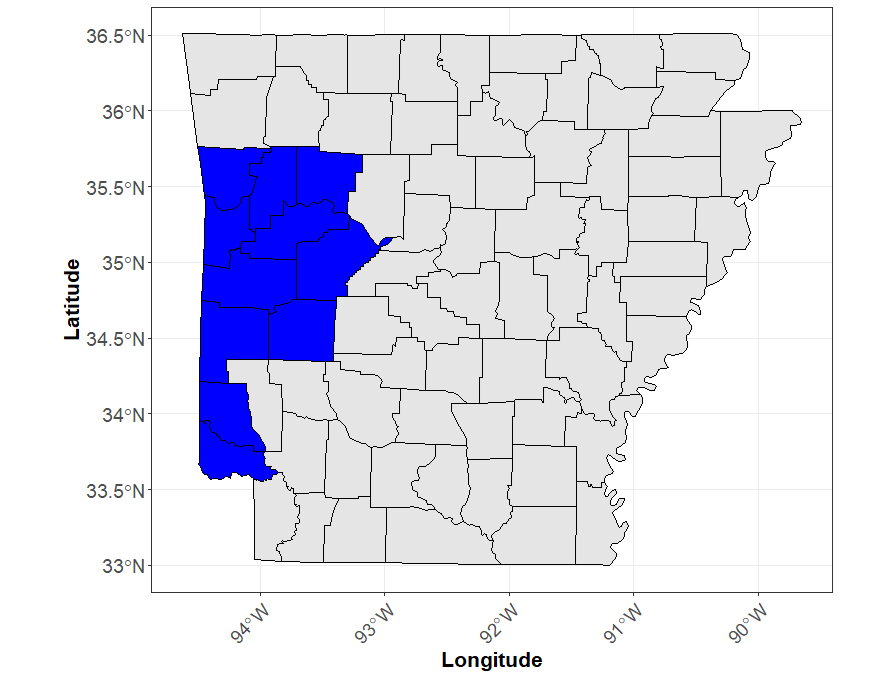Jan. 21, 2022
With new policy, EPA prohibits two Enlist herbicides in 11 Arkansas counties
By Ryan McGeeney
U of A System Division of Agriculture
Fast Facts:
- Endangered Species Act Protection Policy puts news standards on label registrations
- Enlist One, Enlist Duo prohibited in more than 200 counties across country
- Other existing herbicides to face new standards when seeking label renewal
(433 words)
LITTLE ROCK — Growers in 11 counties in western Arkansas are among those in more than 200 counties nationwide who will find themselves without the use of two popular herbicides for the 2022 growing season.
On Jan. 11, the U.S. Environmental Protection Agency granted a seven-year registration renewal to Enlist One and Enlist Duo, both of which are labeled for over-the-top use in Enlist corn, cotton and soybean.
The renewal, however, was among the first to incorporate a standard known as the Endangered Species Act Protection Policy, which takes into account potential impacts on endangered species in a given area.
The affected Arkansas counties include Crawford, Franklin, Johnson, Little River, Logan, Montgomery, Polk, Scott, Sebastian, Sevier and Yell counties.
According to the U.S. Department of Agriculture’s 2017 Census of Agriculture, these counties combined produce about 47,000 acres of soybean and about 15,000 acres of corn.
Tommy Butts, extension weed scientist for the University of Arkansas System Division of Agriculture, said that while the Enlist products are prohibited in the specified areas, the underlying active ingredient, a chemical compound known as 2,4-D, is not.
“Those products are used over-the-top in Enlist cotton and soybean, along with some Enlist corn, in Arkansas,” Butts said. “Typically, when the EPA approves or revokes labels, they go off the marketed product — Enlist, in this case — not the actual active ingredient. So growers in those counties will have 2,4-D products available to them for other uses such as pastures, turfgrass and homeowner use.
“However,” he added, “No other 2,4-D products are available for over-the-top use in Enlist crops.”
As other pesticides labels come up for renewal, however, they may be subject to the more stringent standards.
“I can’t tell you what’s going to be banned where, but I can tell you that I am very nervous moving forward,” Butts said. “I would expect that we’re going to have to deal with these prohibitions for multiple pesticides as they come up for registration.”
Butts said his advice to growers who now find themselves without the use of their preferred herbicide is the same as that he offers to any other grower, which can be summed up with the acronym SPORTS: Start clean, pre-emergence herbicides, overlap residuals, required integrated weed management tactics, timely, selection of multiple, effective modes-of-action herbicides.
“Start the season with a clean field,” Butts said. “Use pre-emergent herbicides, use overlapping applications of residual herbicides, use required integrated weed management tactics such as narrow row spacing, be timely with your scouting and application and be selective with your herbicides — don’t just rely on broad-spectrum herbicides and hope for the best.”
Addidtional comment was being sought from the EPA.
To learn about extension programs in Arkansas, contact your local Cooperative Extension Service agent or visit www.uaex.uada.edu. Follow us on Twitter and Instagram at @AR_Extension. To learn more about Division of Agriculture research, visit the Arkansas Agricultural Experiment Station website: https://aaes.uark.edu. Follow on Twitter at @ArkAgResearch. To learn more about the Division of Agriculture, visit https://uada.edu/. Follow us on Twitter at @AgInArk.
About the Division of Agriculture
The University of Arkansas System Division of Agriculture’s mission is to strengthen agriculture, communities, and families by connecting trusted research to the adoption of best practices. Through the Agricultural Experiment Station and the Cooperative Extension Service, the Division of Agriculture conducts research and extension work within the nation’s historic land grant education system.
The Division of Agriculture is one of 20 entities within the University of Arkansas System. It has offices in all 75 counties in Arkansas and faculty on five system campuses.
Pursuant to 7 CFR § 15.3, the University of Arkansas System Division of Agriculture offers all its Extension and Research programs and services (including employment) without regard to race, color, sex, national origin, religion, age, disability, marital or veteran status, genetic information, sexual preference, pregnancy or any other legally protected status, and is an equal opportunity institution.
# # #
Media contact:
Ryan McGeeney
Communications Services
University of Arkansas System Division of Agriculture
Cooperative Extension Service
(501) 671-2120
rmcgeeney@uada.edu
